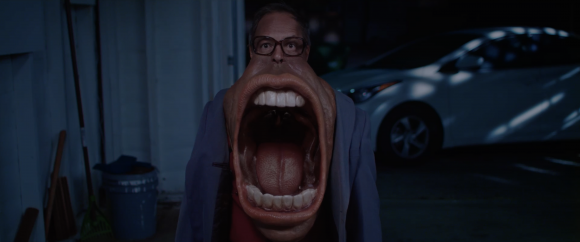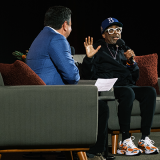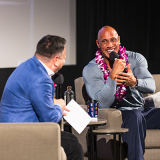How 27 Chapman Alums Collaborated to Make a ‘Weird and Wild’ Feature Film Alumni Spotlight: Skye Braband ('18), Sarah De Leon ('18), Marty Lang ('16)
February 4, 2022
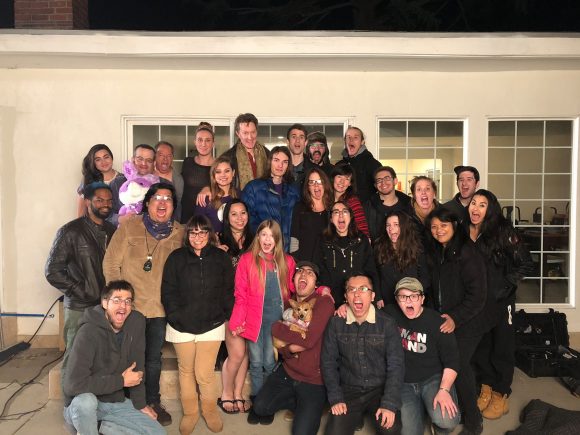 Between 2017 and 2020, Skye Braband (’18), Sarah De Leon (’18), and Marty Lang (’16), along with 24 other Dodge alumni, had the opportunity to collaborate on the feature film Chompy and The Girls, a horror/comedy that draws attention to deeper issues surrounding mental health. The film is centered around a young woman who meets her father for the first time. Their first encounter quickly goes from awkward to alarming when they witness a man swallow a girl whole. We had the chance to talk to Skye, Sarah, and Marty about their experience working on Chompy and The Girls with 24 other Dodge alums and how Chapman helped them get to where they are in their careers today:
Between 2017 and 2020, Skye Braband (’18), Sarah De Leon (’18), and Marty Lang (’16), along with 24 other Dodge alumni, had the opportunity to collaborate on the feature film Chompy and The Girls, a horror/comedy that draws attention to deeper issues surrounding mental health. The film is centered around a young woman who meets her father for the first time. Their first encounter quickly goes from awkward to alarming when they witness a man swallow a girl whole. We had the chance to talk to Skye, Sarah, and Marty about their experience working on Chompy and The Girls with 24 other Dodge alums and how Chapman helped them get to where they are in their careers today:
What prompted you, Skye, to write Chompy & The Girls? Was it because of the horror/comedy genre or its deeper meaning about mental health?
Skye: I wouldn’t say one came first, they came together. I’ve always liked stories that manage to tackle serious subject matter in a fun, accessible way. The initial idea was to take two people, both unhappy with the course their lives are taking (although both at very different stages of life) and throw them into some kind of crazy situation. But I didn’t initially know what situation that would be (the Chompy part of the story didn’t come until later, nor did the father-daughter dynamic).
Sarah De Leon and Marty Lang, how did all 27 Chapman Alumni come together for this project? What made you interested in working on it?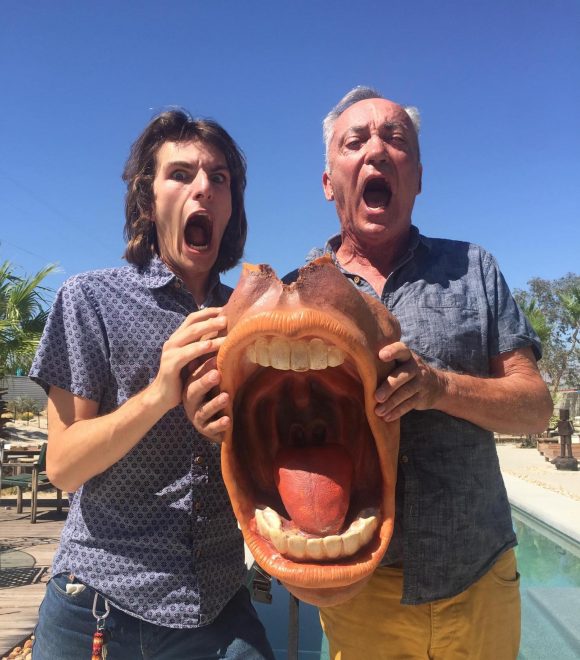
Sarah: Skye and I were fortunate enough to have made both personal and professional relationships with many talented students during our years at Dodge College. I had been a writer/producer on several projects. Skye had written/directed a few as well. Together, we had experience working with many fellow students who believed in our vision and really came through for us. Most key crew members for this project were from Chapman. It was a dream team of people we knew we could trust.
In 2015 I produced a short project that Skye had directed so I knew that we worked well together. When he approached me with the opportunity to produce his first feature, it didn’t take much convincing for me to say yes. The script was well written and spoke to me on a thematic level. I knew right away that it was going to be a weird and wild project that would not be easy to make, but I had faith in us. I knew that between the two of us, we had the resources and skills necessary to make Chompy come alive. It was a challenge I happily accepted.
Marty: I was interested in working on this because I got to know Sarah and Skye while working at Dodge College; I was the Undergraduate Production Manager there from 2015-2017. I worked a lot with Sarah in that role, as she produced her projects, and then when she told me she was gearing up to make Chompy with Skye, I thought it would be a great experience working with both of them, and helping them through the process, since I had produced feature films before.
What major were you studying at Chapman and how did it benefit you in your professional career and get you to where you are now?
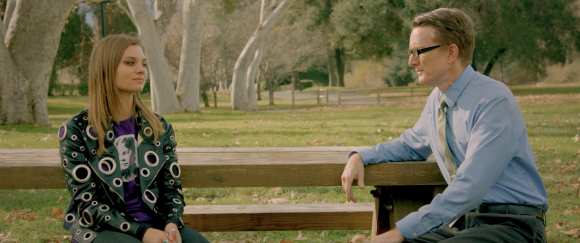
Skye: I was in Television Writing/Production – I initially applied for Film, but didn’t have the high school grades to cut it. At the time I was disappointed, but it all actually worked out – if I had a thesis film to worry about Senior Year, I never would have had the time to shoot Chompy and the Girls during Interterm. The most helpful thing for me at Dodge was all the connections I made. So many of the people involved in this project, and the people I collaborate with today, were people I met at Dodge.
Sarah: I studied screenwriting while I was a student at Dodge College. In addition to helping me become a better writer, the program taught me how to give notes, take notes, and recognize quality scripts. Part of the reason why I chose to produce Chompy and the Girls was because I knew it was a well written story with characters people would connect to.
I am currently the VP of Development at a small production company called 13 Paces. The owner has me read and cover any scripts that come his way. He trusts the input I give him and takes my notes to heart when he considers taking on a new project. A good example would be his latest film Shelter. The original script was decent and had a good concept, but it needed a lot of work. I also pointed out that the story would be more original if it featured female characters in roles that are normally given to men. Not only did the writer adjust the script based on my notes, but the film now features 3 female protagonists that used to be men, including the main character.
Scripts are a good foundation of what makes a good film/tv series, so it is important to recognize what good writing looks like and how to improve scripts before it’s too late.
Marty: I received a Professional Screenwriting Certificate from Chapman in 2016, and I wanted to continue my story development skills, so working on Chompy was a great way to experience a story making its way from script to screen. It has been a huge benefit in my professional career: now I’m an Assistant Professor of Film at the University of Memphis, and I actually showed clips from Chompy when I interviewed for the position. I also taught a Producing for Film course last spring at the U of M, and I showed Chompy’s trailer, marketing materials, and crowdfunding campaign to my class as examples of how films are financed, made, marketed, and sold.
Were there any specific resources (i.e., certain professors, courses, workshops, career advising, etc.) at Chapman that contributed to your career journey post-graduation?
Skye: Harry Ufland’s field trips where we would go and meet with executives were always illuminating. Some of the classes that most influenced me actually had nothing to do directly with filmmaking – Paul Apodaca’s Cultural Anthropology courses, specifically his Cultural Mythology course played a tremendous role towards how I view stories and the role they play in understanding culture – including the culture of modern America. Really fascinating stuff. To anyone at Dodge, particularly if you’re interested in screenwriting, I highly recommend taking some Cultural Anthropology courses if you get the chance.
Sarah: I am currently a writer, producer, and talent manager. I owe all my professional success to many professors and administrators who believed in me and gave me the tools I needed to succeed in the entertainment industry.
Professors Ross Brown and James Gardner recognized that I have the skills to be a good producer, even though it wasn’t my major, and gave me opportunities to produce several projects. The late Jim Deck taught me everything I needed to know about how to run a successful set. Because of their faith in me, I received the experience and confidence I needed to produce independent films. I have since produced two short films and two feature length films, including Chompy and the Girls.
I have written 5 produced short films in addition to a spec comedic pilot that has won several awards. I am the writer I am today because of my screenwriting professors. Professors Anne Beatts and Ron Friedman taught me how to write comedy. Paul Gulino drilled story structure in my head and always encouraged me to think outside the box. James Dutcher and Jeff Phillips are masters at dialogue and taught me how to structure memorable scenes. Paul Wolansky gave me great advice for character development and how to write from the heart. And finally – George Marshall taught me how to take everything I learned and translate that to television. they all challenged me to grow as a writer, laughed at my dumb jokes, and gave me storytelling advice I hold near and dear to my heart.
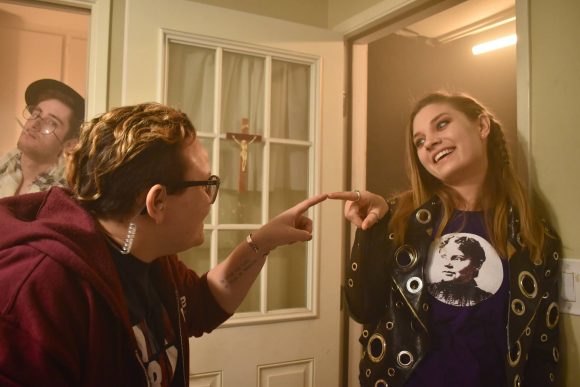
Marty Lang was an administrator while I was a student at Dodge College. He taught me that a career in the industry is what you make of it. I thought that to be successful in this business I would have to live in LA forever and work my way up from an assistant. He showed me that there are so many other paths to success. As a result, I am not working remotely from Oregon. As a writer and talent manager, I have the privilege to work anywhere I want. As a producer, I learned that most pre-production work can be done remotely, and I would only need to travel once I am needed on set. Or better yet, I can bring the production to me. One day I hope to run my own production company and I no longer feel as though I need to deal with LA traffic to do so.
Marty: I’ve been able to work closely with Screenwriting Professor Matt Deller since completing the Professional Screenwriting Certificate program, and he’s been such a huge help for me. We talk a lot about how to get work out into the professional market, how to market myself as a writer, and how to use independently-created projects, like Chompy, to help build momentum and create opportunities. I consider him a friend, and he’s an incredible teacher.
Any parting thoughts or advice?
Sarah: First, try new things – you never know what might happen. Don’t feel as though you need to stick to only one role. When I was a freshman in college, I never thought I’d be a producer or a talent manager, but I kept saying ‘yes’ to opportunities that led me down a career path I’m not carving for myself. In addition to producing, I tried to be an AD and set designer on a couple of student short films. I learned very quickly that these are roles I do not enjoy and would need to pass off to someone else. We all have strengths and weaknesses, and I think it is just as important to know what you don’t want to do or areas you aren’t as skilled in.
Second, recognize the strengths in others – Part of what sets Chapman apart from other film schools is the fact that it values cooperation over competition. Look at your peers as future collaborators. That’s what I did, and now I have a network of people I know I can turn to when I’m putting together a crew or need help with something I’m writing. When you see the best in others and learn to value their strengths, it will make you a better team player and help you gain the connections necessary for succeeding in this industry. If you lift others up and support their careers, one day they just might be able to do the same for you.
Marty: Chapman film students have such incredible opportunities for both production and mentorship while they’re in school. Take advantage of every opportunity and become friends with everyone you can. Sarah took the time to befriend me and I wasn’t even a faculty member there. Because of that friendship, we were able to help create a feature film that’s played in theaters and is digitally available internationally!
Skye: If you want to make stuff, make stuff. Whatever resources you have, even if it’s just a couple friends shooting something with an iPhone, just keep making stuff.
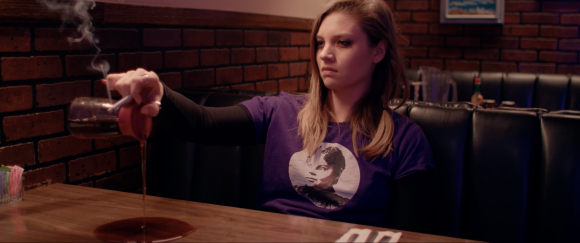
Along with Skye, Marty, and Sarah, below are the names of all other Chapman Alumni that worked on Chompy and the Girls:
Chelsea Fenton ‘16 (Associate Producer), Alan Macchiarolo ‘17 (Executive Producer/Editor), Amanda Remy ‘20 (Social Media Coordinator/Spanish Toothache Girl), Shamola Kharkar ‘17 (UPM), Spencer Kaseff ‘19 (1st AD), Emily Gimbel ‘18 (2nd AD), Kelsi Teramae ‘17 (Production Designer), Xuchen Song ‘17 (Sound Mixer), Jalen Marcus ‘17 (Script Supervisor), Julie Brown ‘17 (Art Department), Ellen Webre ‘17 (BTS Photographer/Set Dresser), Derek Daniels ‘18 (2nd Unit 2nd AD), Anthony Deng ‘17 (2nd Unit DIT), Kyle Harrington ‘19 (On Set VFX Supervisor), Noah Dains ‘19 (On Set VFX), Matt Garcia ’17 (Boom Operator), Casey Donavon ’19 (w/The Toxhards – Opening title song), Anna Owenson (Animator), Michael Shusterman (Finishing Editor), Annie Liu (Colorist), Luke Snecdor (VFX), Enrique De La Garza (VFX), Emerson Harris (Sound Design), Naveed Mahboobian (Lawyer), Breeana Kovelman (Assistant Editor).
Click below to watch Chompy & the Girls!

